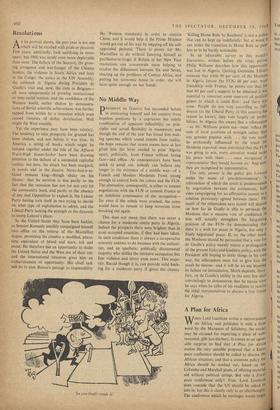No Middle Way
pRESIDENT DE GAULLF. has succeeded before in extricating himself and his country from hopeless positions by a capricious but subtle combination of apparent inflexibility on prin- ciples and actual flexibility in manceuvre; and though the end of the year has found him mak- ing speeches which sound remote from reality, the hope remains that recent events have at last given him the lever needed to prise Algeria apart, politically, from France without losing face—and office. As commentators have been quick to point out, nobody can believe any longer in the existence of a middle way—of a French and Moslem Moderate Front strong enough to control both the colons and the FLN. The alternative, consequently, is either to resume negotiations with the FLN or commit France to an indefinite continuance of he occupation-- for even if the rebels were crushed, the army would have to remain to keep terrorism from breaking out again.
This does not mean, that there was never a chance for a moderate centre party in Algeria. Indeed the prospects there were brighter than in most occupied countries, if they had been taken. In such conditions there is always a co-operative minority anxious to do business with the authori- ties, and an apathetic, politically disinterested majority who dislike the intrusive occupation but fear violence and terror even more. This majo- rity, flaccid though it is, can provide solid back- ing for a moderate party if given the chance.
'So you finally made it.' 'Killing Home Rule by Kindness' is not a policy that can be kept up indefinitely; but at worst It can make the transition to Home Rule so paill" less as to be barely noticeable. In an admirable survey in this month's Encounter, written before the crisis period, Philip Williams describes how this opportunitY was lost in Algeria. Quoting Germaine Tillon's estimate that while 90 per cent, of the Moslems in Algeria favour the FLN, 60 per cent. want friendship with France, he points out that for that 60 per cent's support to be obtained it was essential to construct some reservoir of political power to which it could flow: and there was none. People do not vote according to their desires (as the Liberal Party in this country has reason to know); they vote largely on proba. bilities. In Algeria this means that a referendolll --as Mr. Williams points out—must 'reflect the sum of local positions of strength rather than any genuine popular wish . . . the vote would be profoundly influenced by the result the Moslems expected; once convinced that the FIN was going to win, every attentive would make his peace with them . . . once recognised as representative they would become so.' And noW, they are recognised as representative. The -only answer is the policy put forward under the name of 'pre-determination': Ill referendum of which the result is predetermined by negotiation between the contestants, both sides campaigning for an affirmative answer to a solution previously agreed between them.' The result of the referendum next month will depend on how far de Gaulle is able to persuade the Moslems that a massive vote of confidence ill him will actually strengthen the bargaining position of the FLN—by demonstrating alai there is a wish for peace in Algeria, but only a freely negotiated peace. If, on the other hand, the Moslems should be persuaded that a vote for de Gaulle's policy merely means a prolongation of the present kicks-and-kindness policy, with the President still hoping to settle things in his mvn way, the referendum must fail to give him the result he desires—and it will be no use blaming its failure on intimidation. Much depends, therc• fore, on de Gaulle's 'ability in the next few daY5 convincingly to demonstrate that he means what he says when he talks of his readiness to receivc. the rebel representatives to discuss a free future for ,Algeria,


































 Previous page
Previous page